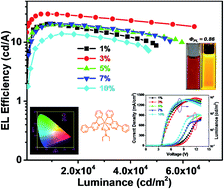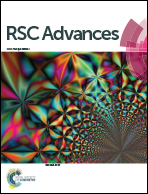Highly efficient orange phosphorescent organic light-emitting diodes based on an iridium(iii) complex with diethyldithiocarbamate (S^S) as the ancillary ligand†
Abstract
A novel iridium(III) complex Ir(dpp)2(dta) (dppH = 4,6-diphenyl pyrimidine; dta = diethyldithiocarbamate) was synthesized and characterized. The complex displayed strong emissions at 575 nm with high photoluminescence quantum yields of 86% in the doped poly(methyl methacrylate) (PMMA) film at 1% doping concentration. The orange-yellow polymer light-emitting devices (PLEDs) based on Ir(dpp)2(dta) as a triplet emitter with different concentrations (x = 1%, 3%, 5%, 7% and 10%) doped in a polymeric host 70% poly(N-vinylcarbazole) (PVK) + 30% 2,2′-(1,3-phenylene)bis[5-(4-tert-butylphenyl)-1,3,4-oxadiazole] (OXD-7) were fabricated with high luminance and efficiency. The device achieved an ideal turn-on voltage (<4 V) and superior luminance (81 918 cd m−2) as well as electroluminescence efficiency (30.12 cd A−1) at 3% doping concentration.


 Please wait while we load your content...
Please wait while we load your content...